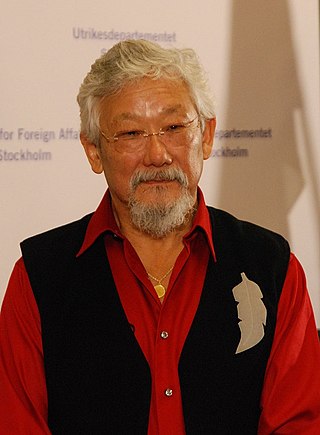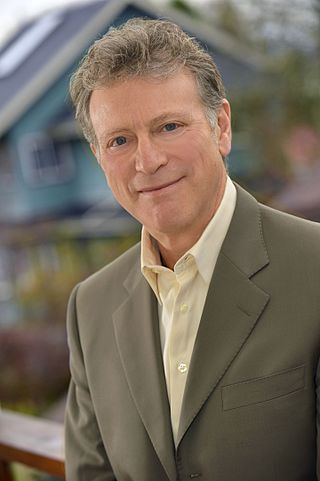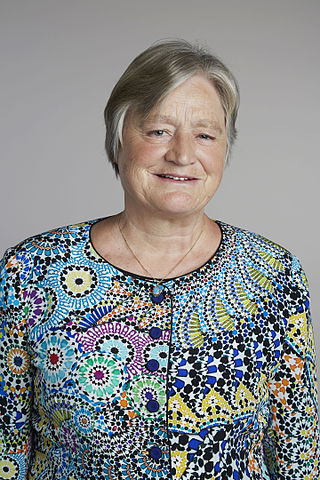
The United Nations Environment Programme (UNEP) is responsible for coordinating responses to environmental issues within the United Nations system. It was established by Maurice Strong, its first director, after the United Nations Conference on the Human Environment in Stockholm in June 1972. Its mandate is to provide leadership, deliver science and develop solutions on a wide range of issues, including climate change, the management of marine and terrestrial ecosystems, and green economic development. The organization also develops international environmental agreements; publishes and promotes environmental science and helps national governments achieve environmental targets.

The World Meteorological Organization (WMO) is a specialized agency of the United Nations responsible for promoting international cooperation on atmospheric science, climatology, hydrology and geophysics.
Gordon McBean is a Canadian climatologist who serves as chairman of the board of trustees of the Canadian Foundation for Climate and Atmospheric Sciences. He is a professor at the University of Western Ontario and Chair for Policy in the Institute for Catastrophic Loss Reduction. Previously he was the Assistant Deputy Minister of Meteorological Service of Canada.

David Takayoshi Suzuki is a Canadian academic, science broadcaster, and environmental activist. Suzuki earned a PhD in zoology from the University of Chicago in 1961, and was a professor in the genetics department at the University of British Columbia from 1963 until his retirement in 2001. Since the mid-1970s, Suzuki has been known for his television and radio series, documentaries and books about nature and the environment. He is best known as host and narrator of the popular and long-running CBC Television science program The Nature of Things, seen in over 40 countries. He is also well known for criticizing governments for their lack of action to protect the environment.

Bert Rickard Johannes Bolin was a Swedish meteorologist who served as the first chairman of the Intergovernmental Panel on Climate Change (IPCC), from 1988 to 1997. He was professor of meteorology at Stockholm University from 1961 until his retirement in 1990.
Environment and Climate Change Canada is the department of the Government of Canada responsible for coordinating environmental policies and programs, as well as preserving and enhancing the natural environment and renewable resources. It is also colloquially known by its former name, Environment Canada.

Bharrat Jagdeo is a Guyanese politician who has been serving as Vice President of Guyana since 2020, in the administration of President Irfaan Ali. He had previously also held the office from 1997 until 1999, during the presidency of Janet Jagan. Jagdeo subsequently served as the President of Guyana from 11 August 1999 to 3 December 2011. He also holds a number of global leadership positions in the areas of sustainable development, green growth and climate change.

The Nature Conservancy (TNC) is a global environmental organization headquartered in Arlington, Virginia. As of 2021, it works via affiliates or branches in 79 countries and territories, as well as across every state in the US.

Sir John Theodore Houghton was a Welsh atmospheric physicist who was the co-chair of the Intergovernmental Panel on Climate Change's (IPCC) scientific assessment working group which shared the Nobel Peace Prize in 2007 with Al Gore. He was lead editor of the first three IPCC reports. He was professor in atmospheric physics at the University of Oxford, former Director General at the Met Office and founder of the Hadley Centre.
Fredrick Kenneth Hare, was a Canadian climatologist and academic, who researched atmospheric carbon dioxide, climate change, drought, and arid zone climates and was a strong advocate for preserving the natural environment.
The Bureau of Meteorology is an executive agency of the Australian Government responsible for providing weather services to Australia and surrounding areas. It was established in 1906 under the Meteorology Act, and brought together the state meteorological services that existed before then. The states officially transferred their weather recording responsibilities to the Bureau of Meteorology on 1 January 1908.

The Canadian weather radar network consists of 33 weather radars spanning Canada's most populated regions. Their primary purpose is the early detection of precipitation, its motion and the threat it poses to life and property.

A tropical cyclone is a rapidly rotating storm system with a low-pressure center, a closed low-level atmospheric circulation, strong winds, and a spiral arrangement of thunderstorms that produce heavy rain and squalls. Depending on its location and strength, a tropical cyclone is called a hurricane, typhoon, tropical storm, cyclonic storm, tropical depression, or simply cyclone. A hurricane is a strong tropical cyclone that occurs in the Atlantic Ocean or northeastern Pacific Ocean. A typhoon occurs in the northwestern Pacific Ocean. In the Indian Ocean and South Pacific, comparable storms are referred to as "tropical cyclones". In modern times, on average around 80 to 90 named tropical cyclones form each year around the world, over half of which develop hurricane-force winds of 65 kn or more.

Inez Fung is a professor of atmospheric science at the University of California, Berkeley, jointly appointed in the department of earth and planetary science and the department of environmental science, policy and management. She is also the co-director of the Berkeley Institute of the Environment.

George Heyman is a Canadian politician and former social, environmental and labour activist. He has represented the district of Vancouver-Fairview in the Legislative Assembly of British Columbia since 2013 as a member of the British Columbia New Democratic Party. He currently serves as Minister of Environment and Climate Change Strategy of British Columbia.

Julia Mary Slingo is a British meteorologist and climate scientist. She was Chief Scientist at the Met Office from 2009 until 2016. She is also a visiting professor in the Department of Meteorology at the University of Reading, where she held, prior to appointment to the Met Office, the positions of Director of Climate Research in the Natural Environment Research Council (NERC) National Centre for Atmospheric Science and founding director of the Walker Institute for Climate System Research.
At the Toronto Conference on the Changing Atmosphere: Implications for Global Security, hosted by Canada in Toronto, Ontario, starting on 27 to 30 June 1988, the 300 participants—including policy makers, international scientists, non-governmental and governmental organizations, and United Nations organizations—issued a warning at the conclusion of the conference that humans had unintentionally triggered uncontrolled changes to the atmosphere that if left unchecked could ultimately lead to "consequences could be second only to a global nuclear war." The Toronto Conference took place in the same week that James Hansen, who served as director of NASA's Manhattan-based Goddard Institute for Space Studies (GISS) from 1981 to 2013, had cautioned in his 23 June 1988 testimony before the United States Senate Committee on Energy and Natural Resources, that it was 99% certain that the global "warming trend was not a natural variation" but was the result of by a "buildup" of CO2 and other "artificial gases in the atmosphere." The Conference "launched" discussions of potential international action and public policy responses to climate change which included early targets for CO2 emission reductions.












